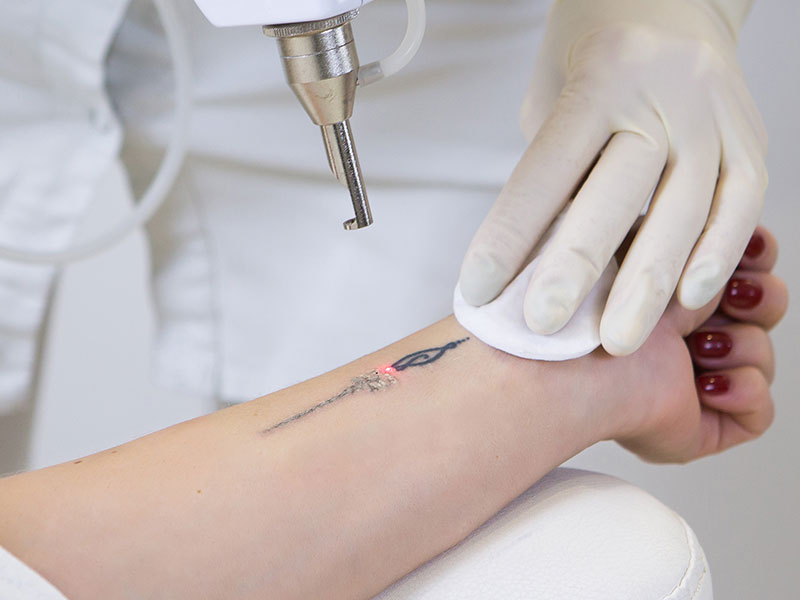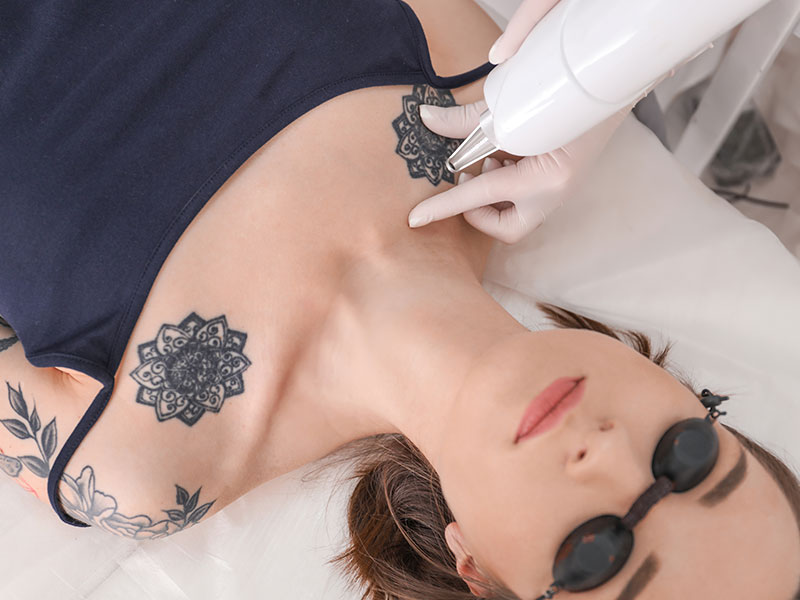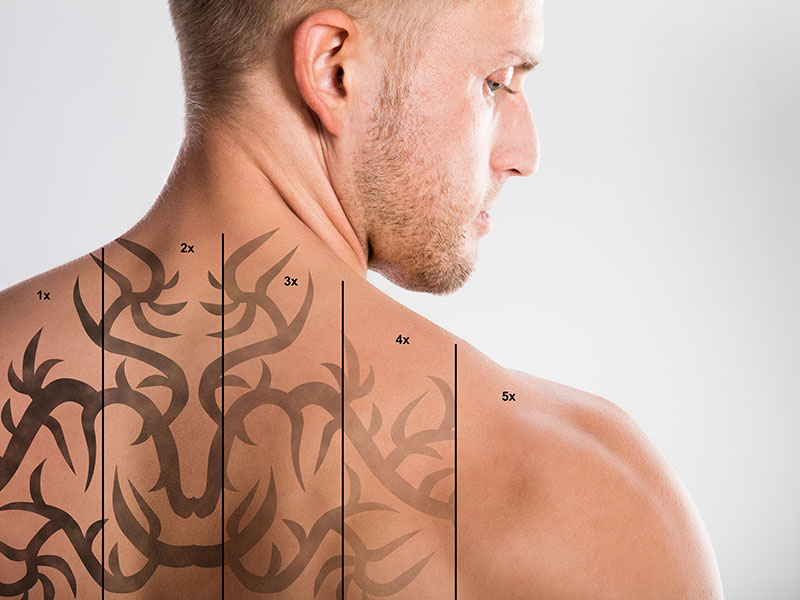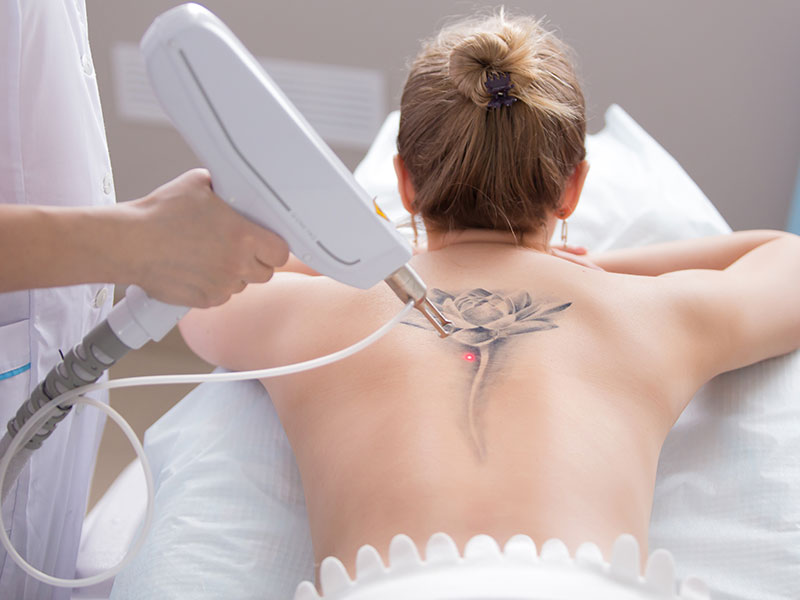
Laser Tattoo Removal
Laser Tattoo Removal
-
LSR-320
35 Hours
- Tuition: $2,495
- Registration Intake: Weekly
-

Erase the past with our laser tattoo removal course where you will discover techniques to break down ink particles in tattoos
1-866-330-9490 ··· Call Us 24 Hours A Day, 7 Days A Week
Course Description
Tattoo removal is most commonly performed using lasers that break down the ink particles in the tattoo into smaller particles. Dermal macrophages are part of the immune system, tasked with collecting and digesting cellular debris. In the case of tattoo pigments, macrophages collect ink pigments, but have difficulty breaking them down. Instead, they store the ink pigments. If a macrophage is damaged, it releases its captive ink, which is taken up by other macrophages. This can make it particularly difficult to remove tattoos. When treatments break down ink particles into smaller pieces, macrophages can more easily remove them.
Tattoo pigments have specific light absorption spectra. A tattoo laser must be capable of emitting adequate energy within the given absorption spectrum of the pigment to provide an effective treatment. Certain tattoo pigments, such as yellows and fluorescent inks are more challenging to treat than darker blacks and blues, because they have absorption spectra that fall outside or on the edge of the emission spectra available in the tattoo removal laser. Recent pastel coloured inks contain high concentrations of titanium dioxide which is highly reflective. Consequently, such inks are difficult to remove since they reflect a significant amount of the incident light energy out of the skin.
STUDENT KIT INCLUDED
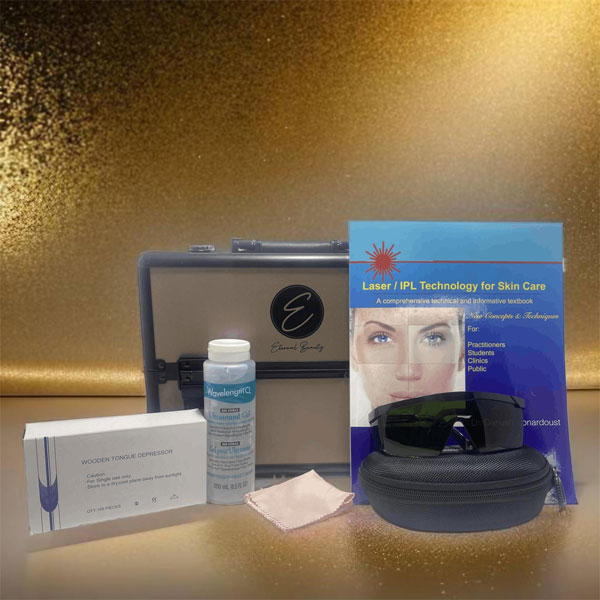
Everything You Need

- e-Learning Student Portal Access
- Textbooks & Learning Material
- Online Video Tutorials
- Unlimited Class Time With Instructors
- Official Certification
- Graduation Photograph
Course Outline
- Bloodborne Pathogen (BBP)
- Skin & Internal Anatomy
- Conditions of the Skin
- Contraindications
- Fitzpatrick Skin Scale & Skin Typing
- Pre & Post Care
- Business Building
- Marketing & Clienteling
- Laser Safety
- Laser Device Comparison
- Laser Market Analysis
- Laser Tattoo Removal Device Options
- Laser Tattoo Removal Picosure

Frequently Asked Questions
Get answers to common enquiries
-
How long does it take to remove a tattoo?
The duration of the tattoo removal process is a concern for virtually all patients. Some patients may wish to remove a visible tattoo before an event – such as their wedding or enlisting in the military. It's important to establish upfront that tattoo removal is a process that relies on the body's ability to eliminate ink from the skin. It's not unusual for the body to take over a year to completely eliminate ink. Setting expectations clearly upfront allows for patients to be satisfied throughout the experience – rather than feeling as if they were misled. To allow the skin enough time to heal between treatments and the body's immune system to flush away ink, we recommend a minimum of six weeks between laser sessions – and eight weeks for darker complexions. Stacking the treatments too close together can cause damage and permanent side effects to the skin and doesn't allow the body enough time to remove the ink that was shattered at the most recent session. For ideal results, we recommend waiting three months between treatments. Ultimately, as a tattoo removal practitioner, you cannot know precisely how many treatments a tattoo will need to be fully removed. However, you should assess the patient's tattoo for how easily it should remove. We generally suggest speaking in terms of treatment ranges with patients. Tattoo removal treatments fit along a bell curve – most patients will need between 5 and 8 treatments, some will see complete removal in 3 or 4, and others may need 10 or more treatments if there is significant scarring or layered tattoos. We suggest telling patients where they are likely to fit along the bell curve based on the unique factors of their tattoo.
-
Does laser tattoo removal hurt?
Laser tattoo removal typically does involve some level of pain. That said, many say that it hurts less than they expected. It's a common belief that tattoo removal is excruciating, yet most patients say that the sensation of removal is comparable to having a tattoo applied. Common descriptions include the sensation of a rubber band snapping against the skin or bacon grease – basically it's uncomfortable but bearable.
-
Will it leave a scar?
What many people don't know is that any scarring that remains after a tattoo removal procedure is often left over from when the tattoo was originally applied by the tattoo artist. When the proper laser protocols and patient aftercare are utilized, it's very uncommon for a patient to scar from a Q-switched laser treatment. However, it is very common for a tattoo to feature pre-existing scarring from when it was applied. When a Q-switched laser treats the skin, it targets and breaks down the tattoo pigment in the skin. If pre-existing scarring is present, it will break down this pigment within the scar tissue. Once the tattoo removal process is complete, the ink will have been eliminated from the location but any of the scarring from the original tattoo will likely still remain. During the initial consultation while you are assessing the tattoo, touch it and see if pre-existing scarring is present. If so, mark it as such in the patient's records and inform the patient that the laser will not eliminate scar tissue, just their ink. A Q-switched laser is not the best device to use for scar revision and will not provide significant improvement to remaining scarring. Some skin specialists use fractional lasers (such as fractional CO2 or erbium) to resurface scarred skin after the tattoo removal process.
Unsure? Try the Career Quiz!
Take The QuizEBI Career Quiz
"*" indicates required fields
Profit Potential
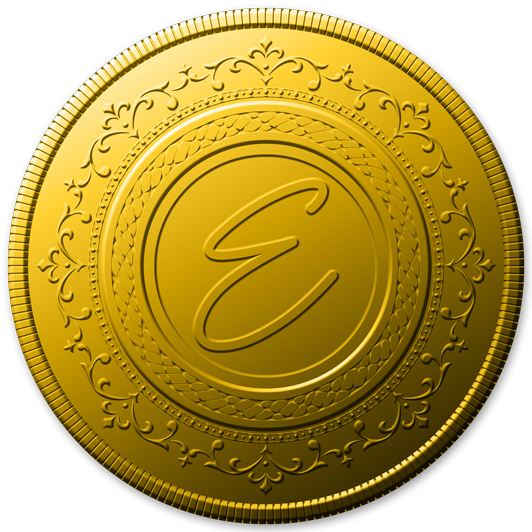
Testimonials
Earn While You Learn
Earn While you Learn or a 50/50 program is a whole new approach to the vocational education platform. Imagine actually earning income while you are in school! Within your first week you can be earning money while in school! How much can you earn… well that is really truly up to you. We have students making thousands per month while still in their training program. The more you study your craft and the more you follow the marketing segment of our curriculum the more you can earn!
Read More
Student Portal
Click here to access the Laser Tattoo Removal Student Portal for all course textbooks, materials & video tutorials
Student Portal© 2024 · Eternal Beauty Institute ··· Policies

